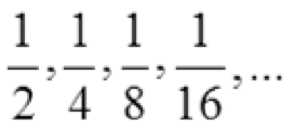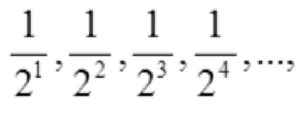The general term (sometimes called the nth term) is a formula that defines a sequence.
For example, for the sequence defined by an = 1/n, the first four terms are found by plugging in 1, 2, 3, 4 for “n”:
1/1, 1/2, 1/3 and 1/4.
Different sequences have different formulas.
The general term is one way to define a sequence. The other way is the recursive definition of a sequence, which defines terms by way of other terms. For example, An = An-1 + 4.
General Term for Arithmetic Sequences
The general term for an arithmetic sequence is an = a1 + (n – 1) d, where d is the common difference.
Example question: What is the general term of the sequence 2, 5, 8,…?
Solution:
- Find d by subtracting the second from first term: d = 5 – 2 = 3.
- Plug d into the general formula: an = a1 + (n – 1) 3
- Plug in the first term for a1: an = 2 + (n – 1) 3
The general term is an = 2 + (n – 1) 3
General Term for Geometric Sequences
For a geometric sequence, the formula is an = a1 rn – 1, where r is the common ratio.
Example question: What is the general term of the geometric sequence 8, 4, 2,…?
Solution:
- Find r the ratio of any two consecutive terms. I’ll use the second and third terms in this example: r = 2/4 = ½.
- Plug r into the general formula: an = a1 ½n – 1
- Plug in the first term for a1: an = 8 (½)n – 1
The general term is an = 8 (½)n – 1.
Using Algebra
If you don’t know what kind of sequence you have, you may have to use a little logic and your knowledge of algebra to get your terms into a workable form. For example, let’s say you’re asked to find the general term for the sequence

This becomes much easier to work with if you change the denominators into exponents (giving an exponential sequence):

Which gives an = ½n
References
Steig, J. 1999. Sequences & Series – General terms. Retrieved January 20, 2021 from: http://www.mesacc.edu/~marfv02121/readings/seq_def/